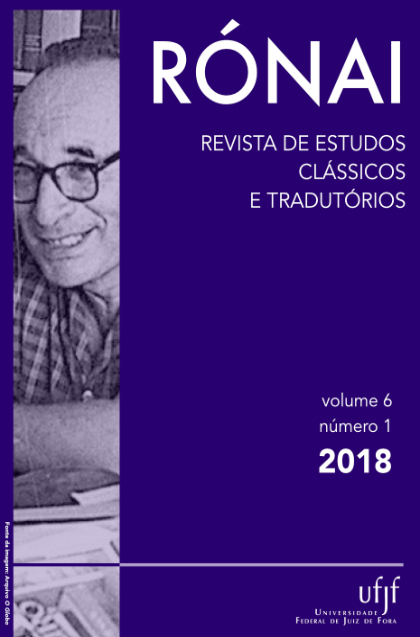References to theater in Cicero's Philipics and theirs implications to Mark Anthony's ethos: the mimo actress Volumnia Cytheris
DOI:
https://doi.org/10.34019/2318-3446.2018.v6.23252Keywords:
Cicero, Philippics, theater, Mark Anthony, Volumnia CytherisAbstract
It’s evident the slanderous content of Cicero’s Philipics against Mark Antony, since in these speeches the speaker attacks the private and political life of his adversary. The main objective of our paper is to study a certain aspect of Cicero’s strategy presenting and analysing some sections from Cicero’s fourteen Philippics in order to verify from them how references to mimo actress Volumnia Cytheris appear and what they mean for the construction of Mark Antony’s image as a comic character.
Downloads
References
BEM, L. A. de. Metapoesia e confluência genérica nos Amores de Ovídio. Tese de doutorado. Campinas: Unicamp, 2011.
BLUME, H. (Münster), “Cytheris”, in: Brill’s New Pauly, Antiquity volumes edited by: Hubert Cancik, Helmuth Schneider. English Edition: Christine F. Salazar. Classical Tradition volumes edited by: Manfred Landfester. English Edition: Francis G. Gentry. Consulted online on 03 December 2017. First published online: 2006.
CICERO. Epistulae ad familiares. Ed. Shackleton Bailey. Londres: Cambridge University Press, 1977.
________. In M. Antonium orationes Philippicae XIV. Ed. Paolo Fedeli. 2. Aufl. Stuttgart: B.G. Teubner, 1986.
________. Cicero. Cambridge, MA; London: Harvard University Press: W. Heinemann, v.6, v.9, v.20, 1989. (The Loeb Classical Library)
________. Philippics I-II. Ed. John T. Ramsey. Cambridge: Cambridge University Press, 2003.
________. Selected letters. Traduzido por P. G. Walsh. Oxford; New York, NY: Oxford University Press, 2008.
RÓNAI: REVISTA DE ESTUDOS CLÁSSICOS E TRADUTÓRIOS – 2018 V.6 N.1 – pp. 4-16 – UFJF – JUIZ DE FORA
CICÉRON. De l’orateur. Livre deuxième. Texte établi et traduit par Edmond Courbaud. Paris: Belles Lettres, 1966.
________. Discours. Tome XIX: Philippiques I à IV. Texte établi et traduit par André Boulanger et Pierre Wuilleumier. Paris: Les Belles Lettres, 1972.
DUNCAN, A. Performance and Identity in the Classical World. NY: Cambridge University Press, 2006.
FANTHAM, E. “Orator et actor”. In: EASTERLING, P.; HALL, E. (org.) Atores gregos e romanos: aspectos de uma antiga profissão. Trad. Raul Fiker. São Paulo, SP: Odysseus, 2008, p. 425-442.
HALL, J. “The Philippics”. In: Brill’s Companion to Cicero: Oratory and Rhetoric. Leiden; Boston; Köln: Brill, 2002, pp. 273-304.
HONORATUS, M.S. In Vergilii carmina comentarii. Servii Grammatici qui feruntur in Vergilii carmina commentarii; recensuerunt Georgius Thilo et Hermannus Hagen. Georgius Thilo. Leipzig. B. G. Teubner, 1881.
JORY, E. J. “Publilius Syrus and the element of competition in the theatre of the republic”. In: HORSFALL, N. (ed.). Vir bonus discendi peritus. Londres: Institute of Classical Studies, 1988, pp. 73-81.
KEITH, A. “Lycoris Galli/Volumnia Cytheris: a Greek Courtesan in Rome”. Eugesta, n.1, pp. 23-53, 2011.
LEIGH, M. “The Pro Caelio and Comedy”. Classical Philology, v. 99, n. 4, pp. 300-335, 2004.
LINTOTT, A. W. Cicero as evidence: a historian's companion. Oxford: Oxford University Press, 2008.
MARONE, P.V. Le Bucoliche. CUCCHIARELLI, Andrea (intr.). Tradução de Alfonso Traina. Roma: Carocci, 2012.
MARSHALL, C. W. The stagecraft and performance of Roman comedy. NY: Cambridge University Press, 2006.
MARCIAL. Martial, Book XIII. Introdução e comentários de Timothy John. London: Duckworth, 2001.
________. Martial, Buch 8. Struttgart: Franz Steiner, 2002.
MAURÍCIO, S. M. M. Cícero – Em defesa de Célio. Dissertação de Mestrado em Estudos Clássicos, na área de especialização em Mundo Antigo. Departamento de Línguas, Literaturas e Culturas da Faculdade de Letras. Coimbra: Universidade de Coimbra, 2013.
RÓNAI: REVISTA DE ESTUDOS CLÁSSICOS E TRADUTÓRIOS – 2018 V.6 N.1 – pp. 4-16 – UFJF – JUIZ DE FORA
MCCUTCHEON, R.W. “Cicero’s Textual Relations: The Gendered Circulation of Definibus”. Helios, v. 43, n. 1, pp. 21-53, 2016.
NÓTARI, T. “El trasfondo jurídico y retórico de la “Pro Caelio” de Cicerón”. REHJ, XXXV, pp. 193-212, 2013.
OVIDIO. Ovid. Cambridge, MA; London: Harvard University Press: W. Heinemann, 1977-96.
PANAYOTAKIS, C. “Women in the Greco-Roman mime of the Roman Republic and Early Empire”. Ordia Prima, v. 5, pp. 121-139, 2006.
PLUTARCO. Vidas paralelas. Trad. Gilson César Cardoso. Introdução e notas de Paulo Matos Peixoto. Quinto volume. São Paulo, Paumape, 1992.
PRATA, P. O caráter intertextual dos Tristes de Ovídio: Uma leitura dos elementos épicos virgilianos. Tese de doutorado. Campinas: Unicamp, 2007.
PROPÉRCIO. Sexti Properti elegia: Elegias de Sexto Propércio. Org. Guilherme Gontijo Flores. Ed. bilíngue. Belo Horizonte, MG: Autêntica, 2014.
RICHLIN, A. “Approaches to the sources on adultery at Rome”. Women’s Studies, v. 8, pp. 225-250, 1981.
SCATOLIN, A. A invenção no Do orador de Cícero: um estudo à luz de Ad Familiares I, 9, 23. Tese (Doutorado em Letras Clássicas). São Paulo: USP, 2009.
SUSSMAN, L. A. “Antony as a Miles Gloriosus in Cicero’s second Philippic”. Scholia, v. 3, pp. 53-83, 1994.
VIRGILIO. Bucolica georgica. Paris: Alberto Tallone, 1953
Downloads
Published
How to Cite
Issue
Section
License
Copyright (c) 2018 Bruna Fernanda Abreu

This work is licensed under a Creative Commons Attribution 4.0 International License.
Copyright
The authors of the published contributions agree with the following items:
1. The authors keep the copyright and convey to the journal the right of first publication, the work being licensed under a Creative Commons Attribution License 4.0 International.
2. The authors are allowed and stimulated to publicize and distribute their work online after the publication in the journal, recognizing first publication in this journal.
3. The authors of the approved works authorize the journal to distribute their content, after publication, for reproduction in content indexes, virtual libraries and similars.
For more information about Creative Commons Attribution License 4.0 International, please, go to: https://creativecommons.org/licenses/by/4.0/deed.en
Editorial exemption
The authors of the published contributions are entirely and exclusively responsible for their contents. Its content does not represent an official position of Rónai - Revista de Estudos Clássicos e Tradutórios neither of Faculdade de Letras da Universidade Federal de Juiz de Fora or their partner institutions.



